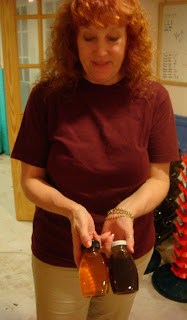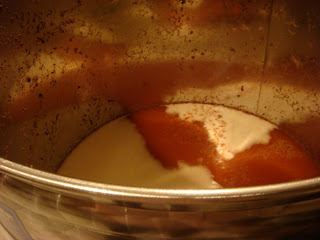Together, at a rousing evening of throwing weapons' practice, Marc Johnson of Birdsboro and Sheree Krasley of Limerick began their soon-to-be entrepreneurial friendship.
Johnson, an active participant in the local chapter of the Society for Creative Anachronism—an international-based group whose members willingly appreciate and recreate life as it was during the Middle and Renaissance Ages, with costumes, craft guilds, courtly dances, archery and mugs of mead—met Krasley through the gleeful group, one that she too is a lively affiliate.
The medieval assembly, who happens to journeys up-and-down the East Coast and also to Nova Scotia, had held an energetic night laden amongst axes, knives and gauntlets almost two years ago, when the duo conceptualized a partnership sculpted around an appropriate, historically-inspired meadery.
Johnson, an active participant in the local chapter of the Society for Creative Anachronism—an international-based group whose members willingly appreciate and recreate life as it was during the Middle and Renaissance Ages, with costumes, craft guilds, courtly dances, archery and mugs of mead—met Krasley through the gleeful group, one that she too is a lively affiliate.
The medieval assembly, who happens to journeys up-and-down the East Coast and also to Nova Scotia, had held an energetic night laden amongst axes, knives and gauntlets almost two years ago, when the duo conceptualized a partnership sculpted around an appropriate, historically-inspired meadery.
"Mead is such an ancient drink," revealed Johnson. "Yet, every couple of years, it makes its reemergence."
Correct in his statement, the ancient beverage—also known as "honey wine"—is enjoying a renaissance of sorts in southeastern Pennsylvania, particularly with recent help from Johnson and Krasley's blends, identified under the moniker, Stonekeep Meadery.
Stonekeep Meadery of Birdsboro, branded with a castle themed logo, is situated in a certified and pristine space of Johnson's home where he produces 9 bottled blends with such ingredients like honey, yeast, water and ranging flavorings. The meadery's recipe roundup is concocted from original and historic recipes that are suggested to date back as far as before the 16th century.
Stonekeep's product, in its basic form, is an alcoholic beverage made from fermenting honey (diluted with water) with yeast. Identified by many as "honey wine," due to the fermentable sugars in the substance that are sourced from the main product, the honey, as well as additives of fruit, spices and malt.
Soon rounding out their second year, the meadmakers report that they processed over 5,000 pounds of honey within in their liquids this year, which is up from last year's total of 4,000 pounds. Already optimistic and striving to match their need for next year, the local creators project that they will make use of 7,000 pounds.
(comparison of how much honey Stonekeep purchases against what the typical consumer buys, the infamous honey bear.)
"We started raising hives of our own," said Johnson. "Right now we have 3 hives, but we know we won't have an excessive amount at first. We will probably begin making a small reserve using just our honey."
However, fulfilling their demand for honey within their mead production would mean that they'd need to raise 100 to 150 hives, almost impossible for both partners who also work daytime jobs outside of the meadery.
However, fulfilling their demand for honey within their mead production would mean that they'd need to raise 100 to 150 hives, almost impossible for both partners who also work daytime jobs outside of the meadery.
Johnson, a software engineer, and Krasley, an agent in collections and record gathering, together follow the regulations of holding a license for Pennsylvania-winemaker, which states that producers must use state-based agriculture.
For example, now in strawberry season's prime, Stonekeep purchased 600 pounds of berries last weekend in Morgantown, for which they produced their popularly sweet strawberry mead.
(the fruit press used by Stonekeep to press all of the fresh fruits used within the meadery's fruit varietals.)
(one of the barrels within their meadery, recently flooded with strawberry mead)
"We process meads that are very diverse," revealed Johnson. "Some are very sweet, very dry, heavy or light with a crisp. Mead has a full range of characters and is not just one entity."
The alcohol content of their meads varies, too, and can range from very low to very high, adds Johnson.
Other varieties of the local meadery, aged from 10 months to two years, include a Black Currant Melomel, perfect for those who adore red wines; a Hibiscus Metheglyn, a crisp mead with a citrus-like taste of hibiscus flowers; an Elderberry Melomel, booming with earthly flavors; and a Vanilla Ginger, identified as a fragrant, delicate sip.
(A lineup of Johnson's bottled blends displaying how honey from different seasons vastly changes the color of your meads.)
The approachable blends are are available for purchase and pick up, as well as at their specialized tasting room of Frecon's Orchards' Outlet in Boyertown and at area restaurants including Sly Fox Brewery and Restaurant of Phoenixville, Teresa's of Wayne and Bube's Brewery of Mount Joy.
"We love educating the public about what mead is," concluded Krasley. "We have become very good at suggesting recommendations towards the tastes you are most drawn to."
"There's a stigma with wine that that if you don't know everything people are afraid to ask questions," said Johnson. "Mead doesn't have that—we are more than willing to answer any questions and change the misconceptions people have about mead."
Also published this weekend in The Phoenix and Tri-County Record.











